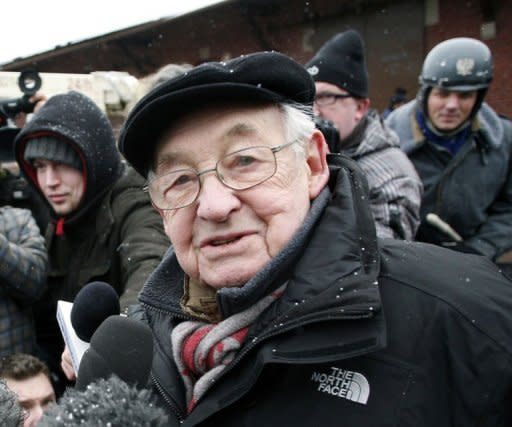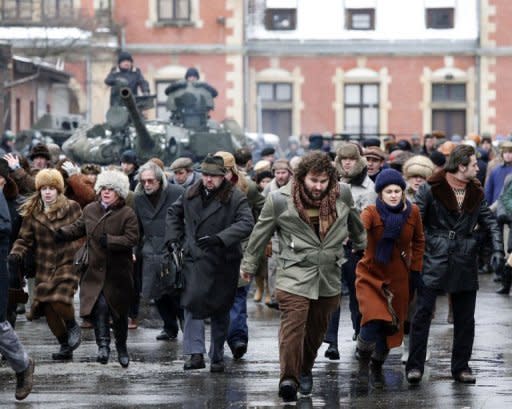Poland's anti-communist icon Walesa, at last the movie
Protesters mass in the streets of Poland's Baltic port city of Gdansk, hurling Molotov cocktails at security forces as a tank advances -- and the cameras roll. Looking on is celebrated Polish director Andrzej Wajda, 85, whose latest film is a biopic about Lech Walesa, the communist-era Solidarity opposition leader who left an indelible mark on world history by helping bring down the Iron Curtain. "I'm playing the role of a resident of Gdansk. I have to run as the cops and the ZOMO riot squad charge into the crowd," said Anna Warmiak, one of some 200 extras on this shoot in mid-January. Walesa, played by Polish actor Robert Wieckiewicz, 45, steps into a clash between security forces and anti-communist protesters. The scene in the film -- entitled simply "Walesa" -- recounts a pivotal moment on the future Nobel Peace laureate's road to renown a decade later. In December 1970, the young electrician saw the communist regime crush a revolt by his fellow workers at the Gdansk shipyard. "He learned a key lesson. The birth of Solidarity in 1980 proves that. Peaceful protest was better. It brought much more than the workers' uprising which ended in bloodshed," Wajda told AFP. His film is a first for the Polish industry which has never before produced a movie about the country's anti-communist icon, now aged 68. "We're trying to get as close as we can to the reality of the era," said the director who won an honorary Oscar in 2000 for lifetime achievement. Walesa is a friend of Wajda, and says he is looking forward to the film's release in October. The actors playing the police -- or militia, as they were known in the communist era -- wear actual uniforms from the period. And their vehicles include a Warszawa, a car that was the jewel in the crown of Poland's communist auto industry. Perhaps the most telling nod to the era is Wieckiewicz's trademark Walesa moustache, which evolves over time. "We've got five different Lech Walesa moustaches, one for each period of his life, as the film spans two decades," said make-up chief Waldemar Pokromski. Founded during a shipyard strike in 1980, Solidarity won grudging recognition from the regime, a watershed for an independent trade union in Soviet bloc nations. But it rapidly snowballed into a broader opposition movement drawing in one Pole in four, and in December 1981 the regime imposed martial law to end the challenge. The union stayed alive underground. Walesa won the Nobel Peace Prize in 1983 for his non-violent opposition. Solidarity returned to the limelight in 1989, negotiating an election deal with the authorities and scoring a victory that summer which brought down the regime peacefully and sped the demise of the Soviet Union in 1991. In 1990, Walesa became Poland's first democratically elected president since World War II, serving one five-year term. He remains a respected democracy campaigner and has lent his know-how to Arab Spring activists. Scripted by Polish author Janusz Glowacki, who has said he aimed to paint a warts-and-all portrait, "Walesa" runs from 1970 until the fall of the regime. Some scenes are combined with period footage. "The latter makes up around 10 percent of the film," said producer Michal Kwiecinski, noting that Wieckiewcz's face will be superimposed on Walesa's in the archive material. Over a 55-year career, Wajda has made dozens of films and is a three-time Oscar nominee: in 1976 for "The Promised Land", 1979 for "The Maids of Wilko" and 1982 for "Man of Iron". The latter film touched on the birth of Solidarity and Walesa had a bit-part, playing himself. About his friend's new biopic, Walesa has said: "I want to learn the truth... without putting anyone under pressure or taking part in the film myself. I'll find out just to what extent I was understood by this great man, Wajda, and his crew."




